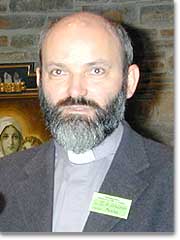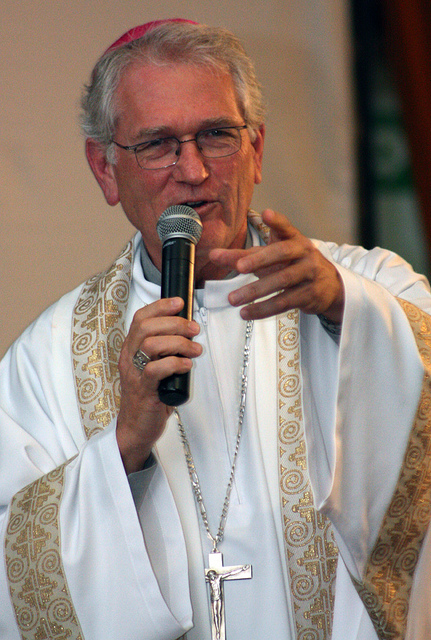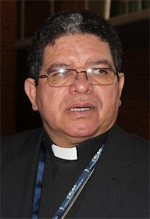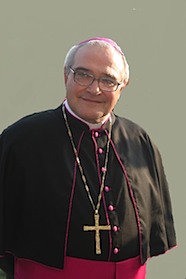|

Komunikat Nru 7 mis-Sinodu tal-Isqfijiet dwar l-Evanġelizzazzjoni Ġdida
biex innisslu l-Fidi Nisranija
Mibgħut lilna
mill-Eċċellenza Tiegħu
Monsinjur Mario Grech, Isqof ta' Għawdex.
23 Ottubru 2012
(1) Fr Heinrich
WALTER, General Superior of the Schoenstatt Fathers (GERMANY)

If we look at the long
term, then the Church in the Western world cannot be renewed without
the renewal of the family. Whoever has childern has a future.
Parents with many children are statistically considered the happiest
persons in society. Marriage and family must be recognized today as
a vocation. This is where evangelization occurs. The believers
follow, going against the current in relationship to society, the
path of the sequela of Christ. For this they must be supported
intensely in the preparation towards matrimony. The Sacrament of
Matrimony is very precious. The failure of matrimony often has
tragic consequences. We must ask ourselves clearly which are the
conditions necessary for the Sacrament of Matrimony. Here a
distinction must be made for the good of the family. The family
remains the foundation for learning the faith. The family means
seeing one’s home as the house of God. Children, with their parents,
follow the lengthy path in learning the faith. The vitality of a
community is connected to these homes. Families are not only the
privileged location for evangelization, but inasmuch as they are
laity they are also agents of evangelization.
(2) H. E. Mons. Leonardo
ULRICH STEINER, O.F.M., Auxiliary Bishop of Brasília (BRAZIL)

By reason of their
special vocation it belongs to the laity to seek the kingdom of God
by engaging in temporal affairs and directing them according to
God's will... There they are called by God that, being led by the
spirit to the Gospel, they may contribute to the sanctification of
the world, as from within like leaven, by fulfilling their own
particular duties. Thus, especially by the witness of their life,
resplendent in faith, hope and charity they must manifest Christ to
others
The document of the
Latin American Conference of Bishops in Santo Domingo (no. 97),
invites all lay persons become the protagonists of new
evangelization, of human promotion and of Christian culture. The
constant promotion of the laity is necessary, free from any type of
clericalism and without diminishing the intra-ecclesial. That the
non-evangelized baptized should become the main recipients of new
evangelization. This will effectively be achieved if the laity,
conscious of their baptism, will answer the calling of Christ to be
converted to being the protagonists of the new evangelization.
New evangelization
should take youths into consideration as ‘new agents’ of
evangelization: the young who evangelize the young. To prepare them
for catechesis, through the participation in the life of the
Community of faith and the missionary experiences to be able to work
in the Community and in society. To consider the new aeropagi of
youths themselves as the world of education, media, internet, art
and others. Indefeasible spaces for the new evangelization.
(3) H. E. Mons.
Santiago J SILVA RETAMALES, Auxiliary Bishop of Valparaíso, General
Secretary of the Latin American Episcopal Council (C.E.L.A.M.)
(COLOMBIA)

New Evangelization can
be carried out if there is the Church has the capacity for empathy
and sympathy with the world and, therefore, a church that talks,
which does not fear anything that is human, especially because the
Son of Man came to bring to fulfillment to all men and to the whole
man. From this perspective the Church "as always" calls to open up
new scenes to evangelize; it cannot be a "traditional” community,
but anchored in a live tradition. It is a community that feels
challenged by the Word of God, which listens with a prolific
silence. It cannot be a powerful community that "im-poses" but which
"ex-poses" because it is fully aware of the holder of the Truth and
Life. No community can be ritualistic, but that which redefines life
and puts it in the horizon of transcendence for sacramental
medidtation.
(4) H. E. Mons. José
ULLOA MENDIETA, O.S.A., Archbishop of Panamá (PANAMA)

As Blessed Pope John
Paul II affirmed: “the future of evangelization depends in great
part on the Church of the home” (FC 52). However, for our family to
reflect the face of the Church of the home, it is necessary to be a
true community of love and life, of faith and salvation. And this
will be possible inasmuch as it is reinforced within the nucleus of
the family and in the sacrament of marriage.
However, in order to
arrive at this we must develop and reinforce a pastoral care that
accompanies marriage and families. We must dedicate more time and
better resources to the preparation for the sacrament of marriage.
We await with great interest the Vademecum prepared by the
Pontifical Council for the Family, which will certainly contribute
to the improvement of the human and Christian qualities of marriage.
We must give greater pastoral dedication to sacramental marriages
already celebrated through guidance programs in order that they be
strengthened and prepared for the fulfilment of their commitments
within the family, Church and society. The catechism of adults
requires more attention on the part of all the Church
(5) H. E. Mons.
Ricardo TOBÓN RESTREPO, Archbishop of Medellín (COLOMBIA)

The New Evangelization
in order to transmit faith should be much more than multiplying what
we have done, it should be a full act, that in the circumstances of
today’s world , highlights the intelligence, guiding freedom, moving
the feelings, committing all life .Evangelization is an event, at
the same time complex and simple. Complex because we can place it in
the order of creation, simple because grace produces it naturally
for those who are willing. In my humble opinion, the various
processes in which evangelization is developed , should favor three
specific and fundamental experiences.
Firstly, the
experience of the fatherhood of God.... Secondly, it is necessary to
have in a concrete way the experience of the Christian community....
Thirdly, we must get to the experience of the joy of giving to God.
The true evangelization arises from the contact with God and with
men in the power of the Holy Spirit. It is the humble and brave
testimony of what is experienced and cannot be silenced.
(6) H. E. Mons. José
Luis AZUAJE AYALA, Bishop of El Vigía, Vice President of the
Episcopal Conference (VENEZUELA)

Faith and charity in
Christian life require that one mutually supports the other. Charity
without faith is mere philanthropy, and faith that is not expressed
in charity is an abstract faith; so both faith and charity involve
the testimony of Christian life. Faith in charity shows us the face
of Christ and sustains the preferential option for the poor, knowing
that this option is "implicit in the Christological faith in the God
who became poor for us, enrich us with his poverty ". Charity, in
turn, bears witness to faith in the Risen Lord, who has given us the
fullness of life.
The Church holds a
valuable instrument of guidance and orientation for a New
Evangelization of the social: Social Doctrine with its missionary
component: the witness of love of Christ through the work of
justice, peace and human development proposed in this doctrine (cf.
VC 15). She must become announcement and witness of faith in the
Resurrected who makes all things new.
(7) - H. Em. Card.
Josip BOZANIĆ, Archbishop of Zagreb (CROATIA)

Since the beginning of
the Church and Christianity, the treasure of faith has found the
highest as well as most fertile manifestation in the courageous
witness of martyrs. The “profession and confession” of faith is
tangible, in fact, in the lives given by pastors, by priests,
religious men and women; but also - this must be emphasized strongly
- by the lay faithful, their families. All, the ones and the others,
humble and courageous witnesses who show - through their martyrdom -
the place where an authentic faith arises and grows: the heart and
the life of who falls in love with Christ.
In the recent history
of the Church in Europe, but also in other places throughout the
world, there are witnesses and experiences of this martyrdom which
arose even as icons of holiness: and the liturgical memory which the
Church celebrates with veneration is the eternal sign that martyrdom
is always the most explicit and convincing form of transmission of
the faith.
I would also like to
call attention to the “new forms of martyrdom”, bloodless but still
suffered, which are present and demanded today in the context of a
globalized world. Faith should
never be closed within the private dimension, because the
Christian’s witness is by its very nature public.
(8) H. E. Mons. Luigi
NEGRI, Bishop of San Marino-Montefeltro (ITALY)

New evangelization
means to re-propose the event of faith as an explicit certitude of
the presence of Jesus in the life of the Church, which is the
educational instrument where faith is consolidated and directs
living the mission as true self-realization. Faith thus becomes
culture, “critical enthusiasm of the faith”, the ability for
dialogue within the horizon of charity. This implies a reasoning
that is open to reality, alien to a techno-scientistic usage aimed
at possessing it.
New evangelization is
the flow of life that takes on different forms of recognition,
worthiness, correction when necessary, propitiating their encounter
in the life of the Church. The action of the Spirit is what must be
supported and which cannot be substituted with human projects.
|